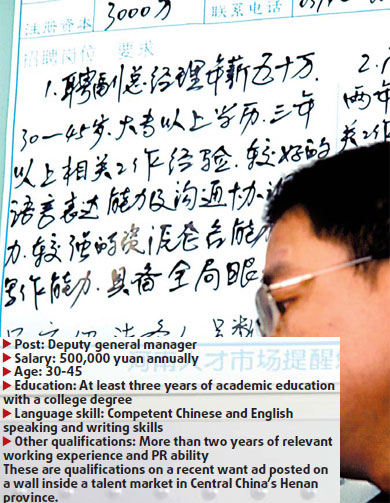
|
BIZCHINA> Industries
 |
|
HR: Hire more now for greater benefits later
By Tuo Yannan (China Daily)
Updated: 2008-12-29 07:48
 Chinese enterprises that found themselves falling behind the talent rush in the past should take heart from the global economic slowdown as it presents a golden opportunity for them to recruit qualified and experienced executives and professionals from around the world. Of course, talent doesn't come cheap, human resources experts say. But it is at least available as more and more US and European multinational companies are going into the retrenchment mode to cut costs.
But before the economic pendulum swings to the other side, there exists a window of opportunity for Chinese enterprises, long constrained by their relatively more rigid pay scales and rudimentary incentive programs, to get the professionals they need to expand their businesses on the mainland and overseas . In an exclusive interview with China Business Weekly, Goodwin, CEO of Antal International, a global recruitment company that charges corporate clients thousands of dollars as consultancy fees, says "hiring people now can bring greater long-term benefit than firing". Goodwin advocates different strategies for local companies, multinational firms already present and for those companies who want to enter China. He stresses that the ultimate objective for all three categories would be "a long-term HR policy". US companies tend to react a little more aggressively to the perceived effects of the global economic downturn and reduce their workforce quickly. On the other hand domestic enterprises and European multinationals have shown greater restraint in their response to the crisis, says Goodwin. In these uncertain times when the developed economies, especially the US, are sliding into a recession, corporate executives need to be careful while formulating the human resources strategies, he says.
"Companies that are now firing people would experience problems next year when the economy improves," Goodwin says. "These companies will have no choice but to start rehiring then at higher costs," he predicted. During the 1998 economic downturn, a US company swiftly laid off 3,500 people to cut costs, he recalls. When the economy began to recover a few years later, it took that same company 18 months to re-hire the people it needed and at much higher costs than before. Because of the difference in corporate cultures, European and Chinese companies tend to follow a much more conservative approach in cost control than their US counterparts. They do not offer big-time salaries to compete for talents, but at the same time they also do not resort to massive layoffs when they encounter bumps, says Goodwin. His advice to foreign companies in China is to save costs by speeding up the process of localization. Companies should hire more Chinese managers and professionals rather than bring people from their own countries. The quality of the Chinese management talent, especially those who have worked in foreign companies has improved rapidly in the past three years, he adds. With the knowledge and cultural gap narrowing, localization is only a simple matter of economics, he says. "Foreign experts may cost the company 300 to 400 dollars every month apart from costs related to accommodation, car, driver and children's education. In contrast, hiring Chinese staff will not cost companies the extra expenditure, says Goodwin. CapitaLand, the Singapore-based investment and real-estate firm is one of the companies that has followed the localization route. "In 2009, we will be hiring even more local talent," says Liew Mun Leong, CEO of CapitaLand. The company's target is to eventually have a 100 percent Chinese management team. "It is very difficult for a foreigner to understand Chinese culture. So the best way is to hire executives locally," says Liew. Opportunity beckons Goodwin says the small- to medium-sized Chinese firms should now take the opportunity to grab whatever talents they can get. Antal has over 600 clients in China and of these 35 percent are local companies. Chinese companies that acquire foreign companies could also encounter talent challenges like when Lenovo took over the PC business of IBM. But Goodwin says, such problems can be solved more easily. "In the next six months, when Chinese companies enter overseas markets, they will see a veritable talent pool of directors, managers and even CEOs from western companies to choose from due to the recession. The Chinese firms can hire them for overseas development as they have better chances to take over struggling US companies," he says. "If the financial crisis had not happened, the smaller companies would never have been able to compete with big corporations for top managers," Goodwin says. "Now is the best time for them to tap the market for talent." The moot question, however, is how to retain the hired talent when the economy starts growing again. Goodwin feels this is not a major deterrent as the small companies can also grow. "Small firms would become mid-sized and they in turn will become big. The talent hired by small and mid-sized companies would also scale up the ladder in tandem with the firms and hence remain loyal to their employers. "As long as the talent feels satisfied with their job and get paid well there is no reason for them to leave for bigger companies," says Goodwin. He adds that it would be prudent for companies that are planning to enter the Chinese market to hire talent locally. "With US companies laying off people, it would be the right time for other foreign firms to hire people from the Chinese talent market," says Goodwin. He cites the example of myweather.com, a meteorologic solution company that is planning to hire local talent for its business expansion. (For more biz stories, please visit Industries)
|
|||||
人妻无码人妻有码中文字幕| 亚洲精品无码久久久| 亚洲不卡无码av中文字幕 | 日韩亚洲变态另类中文| 亚洲精品无码成人AAA片| 性色欲网站人妻丰满中文久久不卡| 久久久久亚洲av无码专区导航| 日韩视频中文字幕精品偷拍| 人妻少妇看A偷人无码精品视频| 亚洲日韩精品无码专区网址 | 精品久久久久久无码不卡| 免费无码专区毛片高潮喷水| 亚洲精品色午夜无码专区日韩| 亚洲av中文无码乱人伦在线播放| 国产日韩精品中文字无码| 亚洲乱码无码永久不卡在线| 精品久久久久久无码中文字幕 | 亚洲精品无码成人片在线观看| 国产成人精品无码片区在线观看| 中文字幕AV中文字无码亚| 亚洲国产午夜中文字幕精品黄网站| 在线观看片免费人成视频无码| 无码AV中文一区二区三区| 亚洲精品无码专区久久同性男| 无码精品一区二区三区免费视频| 亚洲AV无码专区亚洲AV伊甸园 | 亚洲中文字幕无码日韩| 在线中文字幕播放| 日韩久久久久久中文人妻| 中文字幕人妻丝袜乱一区三区| 无码乱码观看精品久久| 久久中文精品无码中文字幕 | 中文字幕久久波多野结衣av| 国产成人无码A区在线观看视频| 免费无码成人AV在线播放不卡 | 无码AV天堂一区二区三区| 亚洲av无码国产精品夜色午夜 | 性无码一区二区三区在线观看| 国产午夜精华无码网站| 无码不卡av东京热毛片| 亚洲av无码一区二区三区网站|